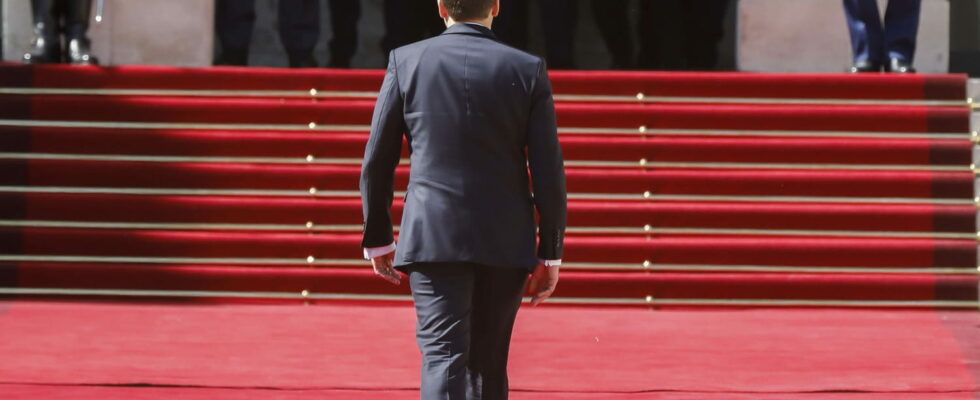Although he does not wish to leave the Elysée, Emmanuel Macron could be forced to do so depending on the situation.
The “pulled grenade” will end up blowing up the French political world. The results of the first round of the legislative elections showed a bipolarization of the French electorate, divided in large part between the extreme right represented by the National Rally and a left-wing bloc made up of 25 parties, united under the banner of the New Popular Front. Between the two, the presidential camp of Renaissance is trying to save the day. Undeniably, Macronie will emerge very weakened from this “dissolution” sequence.
For Emmanuel Macron, this second part of the mandate that is beginning is looking perilous. A majority of RN deputies would condemn him to cohabit with the Frontist party, a relative majority would force him to take on the role of intermediary between the left and the right to try to implement a government of national unity. With the risk of getting bogged down? To the point of resigning? If the scenario is far from being the preferred one, not everyone formally rules it out.
The President of the Republic could very well leave the Elysée Palace before May 2027, the date of the end of his functions. In any case, this is what Pierre Mazeaud, former President of the Constitutional Council, prefers. “To stop these serious difficulties in the country, I am one of those who think that the President of the Republic must resign,” declared the former mayor, deputy and RPR Secretary of State, a figure in political life in the 1970s and 1990s.
“When there is a political blockage, there are three possibilities…”
On the side of the opponents ofEmmanuel Macronthe left has remained silent on the subject, while Marine Le Pen has strongly encouraged the head of state to leave. Even if she “does not call on Emmanuel Macron to resign”, she had “noted that, when there is a political blockage, there are three possibilities: reshuffle, dissolution or resignation of the president. The reshuffle, for once, in this circumstance, would not seem extremely useful to me. The dissolution has just been carried out for a year. The president will therefore only have resignation to potentially get out of a political crisis.”
If he has the gift of surprising his world again as he did with the dissolution, the main interested party has nevertheless ruled out shortening his mandate. “You can trust me to act until May 2027,” wrote Emmanuel Macron in a letter addressed to the French and published in local newspapers, confirming once again what he said in the columns of the Figaro Magazine : “The institutions are clear, the place of the president, whatever the result is also clear”. And if it came to the mind of the new majority to demand the resignation of Emmanuel Macron, in particular to the RN which called for a dissolution of the National Assembly, he warned: “It is not the RN which writes the Constitution, nor the spirit of it”.
A resignation forced by an institutional blockage?
Emmanuel Macron will not give up his functions. But surprises remain possible, such as the announcement of the dissolution of the Assembly on the evening of June 9. The event was proof of the Head of State’s ability to make radical decisions that contradict his previous statements without warning. As a reminder, while the RN demanded a dissolution in the event of victory in the European elections, the President retorted in an interview for The Sunday Tribune And Provence that “the election of European deputies” would call for a “first European conclusion” and not a national one… The head of state can therefore still change his mind about his resignation.
Especially since a presidential resignation is increasingly considered a possible scenario after the legislative elections in one particular case. If no political force obtains a clear majority in the National Assembly, the government could be plunged into an institutional deadlock and become incapable of passing a bill. Emmanuel Macron could then judge that the only solution to get out of the impasse would be to resign and organize a new presidential election. But this option has flaws, because the election of a new president would not resolve the problem of the institutional deadlock in the hemicycle.
Can Macron resign to run for president?
But what if Emmanuel Macron were considering resigning to be able to run again in 2027? This is what several Internet users suspect on social networks, but this hypothesis is not credible. A resignation would not allow the head of state to be elected a third time because article 6 of the Constitution limits the number of consecutive terms possible at the head of state to two: “The President of the Republic is elected for five years by direct universal suffrage. No one may serve more than two consecutive terms.” A resignation does not change the fact that Emmanuel has already served two terms, even if the second is not complete. On the contrary, resigning after the legislative elections would deprive the head of state of his last three years as president before a possible new candidacy in 2032.
